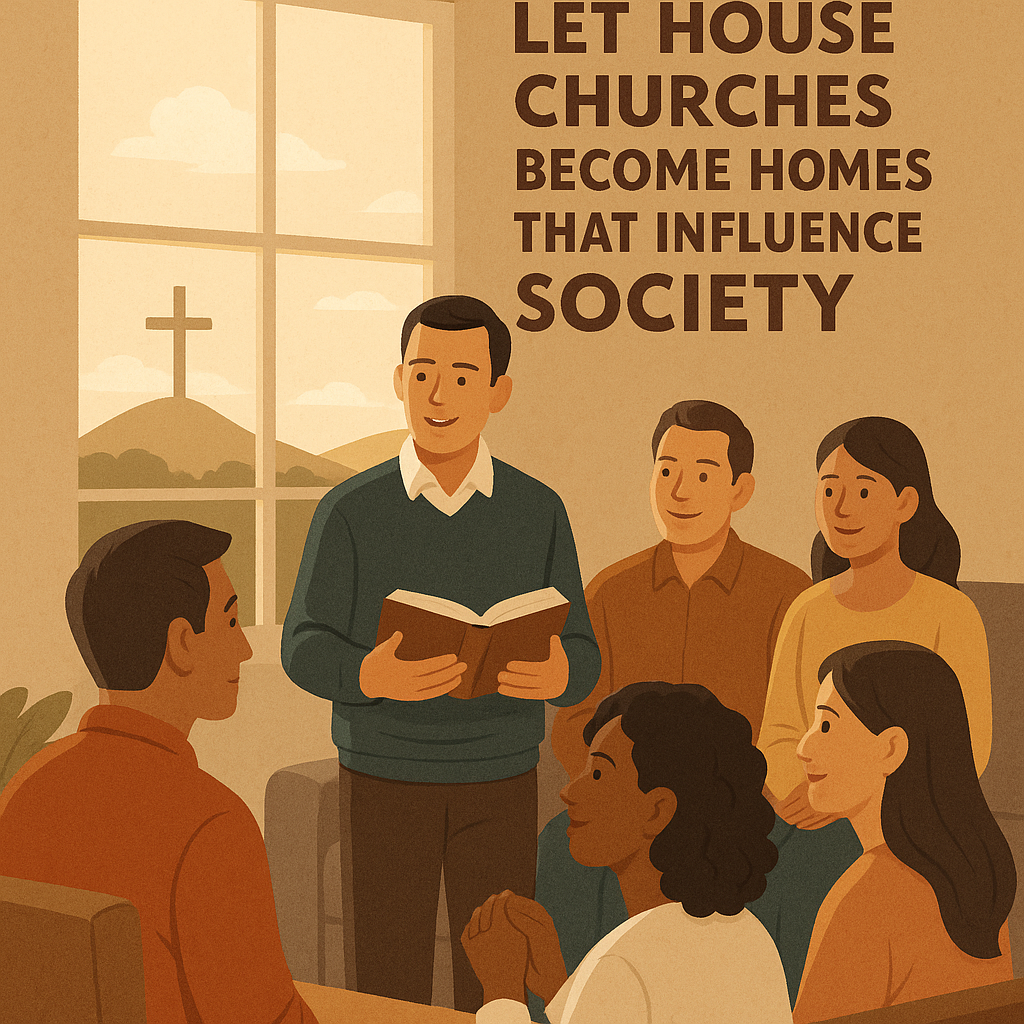文/HuSir
亲爱的弟兄姊妹,
家庭教会的初衷何其美好——在家中围坐,以神的道为中心,让一家人、甚至整个群体在亲密的团契中与主建立深厚的关系。然而,今天我们不得不面对一个痛心的事实:许多家庭教会的聚会变得程式化,缺乏活力;我们忙于形式,却忘了悔改的呼召;我们聚会敬拜,却与社会现实和个人成长脱节。一些弟兄姊妹甚至在长期的信仰生活中,因忽视灵命成长而感到疲惫甚至产生信仰的虚无主义,长期对罪性不加悔改的执念时刻让自己“生活在地狱中”。这是我们必须正视的危机,也是主呼召我们悔改和复兴的时刻。
悔改:信仰的起点与核心
“悔改吧,因为天国近了!”(马太福音 4:17)这是耶稣传道的第一声呼召。悔改不仅是信主之初的决定,更是基督徒每天的操练。然而,今天的家庭教会中,悔改的教导常常被忽视,聚会流于例行公事,讲道重复老套,缺乏对个人生命的触及。我们是否停下来问自己:我最近一次真心向神认罪、悔改是什么时候?我是否在忙碌的聚会中,忘了倾听圣灵的声音?
亲爱的弟兄姊妹,悔改不是负担,而是释放。让我们重新打开心门,摆脱撒但的诸多捆绑和束缚,在祷告中向神倾诉软弱,承认罪性,求主更新我们的心。让家庭教会应成为安全的港湾,每个信徒敢于分享挣扎,彼此代祷,而非只追求外在的“属灵形象”。教会带领者更当回归到一个‘普通人’的样式,回归到一个‘小孩子’的样式,以身作则带领会众回到悔改的根基,教导如何在日常生活中活出基督的样式。
祷告:与神亲密的桥梁
祷告是基督徒与神相交的命脉,但许多家庭教会的祷告常常流于形式,或仅限于聚会中的例行程序。耶稣教导我们:“你们祷告的时候,要进你的内室,关上门,祷告你在暗中的父。”(马太福音 6:6)祷告不仅是求,更是倾听、敬拜和与神建立亲密关系的过程。
我们是否因生活的忙碌而忽略了个人祷告?教会是否只注重集体祷告,却忘了引导信徒操练独处的灵修?家庭教会可以设计小型祷告小组,重新点燃祷告的火,鼓励成员分享个人需要,操练默想和代祷。即便在高压环境下,也可通过不断的操练,让祷告成为每个家庭与神同行的日常。
连接社会:活出信仰的见证
“你们是世上的光……让你们的光照在人前,叫他们看见你们的好行为,便将荣耀归给你们在天上的父。”(马太福音 5:14-16)家庭教会的使命不仅是内部团契,更要成为社会的祝福。然而,许多教会因安全顾虑或资源匮乏,选择了封闭,忽视了贫困、不公、疾病等社会问题。这不仅让教会与现实脱节,也让信仰失去了影响力。这样退缩、缺乏活力的聚会更有可能让年轻人看不到活力而选择疏离教会。
弟兄姊妹,我们的信仰不应局限于四堵墙内。在中国这样一个充满挑战的社会,家庭教会可以在安全范围内,参与力所能及的公益:为贫困家庭送去温暖,为劳工发声,或通过祷告关注社会不公。即便行动受限,我们也能在生活中以爱和公义见证基督——在职场中诚实,在家庭中宽容,在社区中关怀邻里。让我们效法早期教会,以行动回应神的呼召,成为“世上的光”。
灵命成长:从形式到生命的改变
信仰的目的是让生命被神改变,但若聚会只停留在唱诗、听道,却不触及内心,信徒的灵命如何成长?一些弟兄姊妹“一辈子在教会聚会”,却因缺乏悔改和操练,灵性停滞,甚至让身体和心灵双重受损。这是对我们所有人的警醒:教会不是活动场所,而是生命的炼炉。
家庭教会应重新设计聚会,珍惜每一次见面交通的机会,注重每个人灵命的培育。不能让信徒感觉聚会就像是‘空空的来’又感觉‘空空的去’,教会要么成为灵性的加油站,要么成为不悔改的‘批判场所’,要么成为自己灵性长进的分享会。彼此间可以通过查经小组深入探讨神的话语,分享生命见证,促进彼此建造。教会带领者也需接受神学培训,提升讲道质量,让信息贴近社会生活、政治、触及灵魂。同时,鼓励信徒操练灵修、禁食、服事,让信仰从“听”变为“行”。
回应现实的挑战
在中国,家庭教会面临高压环境,聚会形式单一往往是为了安全。然而,安全不应成为灵性僵化的借口。即便在隐秘中,我们也能通过灵活的方式(如分散小组、线上查经)保持信仰活力。面对经济压力(如996工作制)和社会问题(如贫富差距),教会应成为信徒的避风港,提供情感支持、灵性引导,甚至实际帮助(如互助基金)。
同时,我们要警惕世俗化的侵蚀。物质主义和忙碌的生活可能让信徒的心远离神。教会应提醒大家:真正的满足不在金钱或地位,而在与神的同行。让我们效法使徒保罗,“靠着那加给我力量的,凡事都能做”(腓立比书 4:13)。

复兴的盼望
亲爱的弟兄姊妹,家庭教会的使命从未改变:让一家人、一个群体在爱中与神相连,成为社会的祝福。今天的僵化和脱节不是终点,而是主呼召我们悔改、复兴的契机。让我们从自己开始,重新点燃祷告的火,操练悔改的生命,关心身边那些‘邻舍’的需要,用行动见证信仰。
愿每个家庭教会成为生命的家,在其中我们与神亲密同行,彼此扶持,活出基督的爱与公义。让教会成为‘影响社会的家’。愿主赐我们勇气和智慧,在挑战中站立得稳,见证祂的荣耀!
Let House Churches Become Homes That Influence Society
by HuSir
Dear brothers and sisters,
The original intent of house churches is beautiful—gathering at home around God’s Word, so that families and small communities build deep fellowship with the Lord. Yet today we must face a painful fact: many house‐church gatherings have become rote and lifeless. We busy ourselves with forms and routines but forget the call to genuine repentance. We meet to worship yet find ourselves disconnected from social realities and personal growth. Some brothers and sisters, after years of such faith practice, grow weary or slip into spiritual nihilism—fixated on unrepented sin and living as if in hell. This is a crisis we must acknowledge, and it is exactly the moment of repentance and revival to which the Lord is calling us.
Repentance: The Beginning and Heart of Faith
“Repent, for the kingdom of heaven is at hand!” (Matt. 4:17 NKJV)
This was Jesus’ first proclamation. Repentance is not only the decision we make when we first believe, but the daily discipline of every Christian. Yet in many house churches today, teaching on repentance is often neglected—meetings devolve into routine, sermons repeat the same clichés, and fail to touch individual hearts. We must ask ourselves: When was the last time I genuinely confessed and repented before God? Have I become so busy with gatherings that I no longer listen for the Spirit’s voice?
Repentance is not a burden but a liberation. Let us open our hearts again, break free from Satan’s chains, and pour out our weaknesses before the Lord in prayer, acknowledging our sins and asking Him to renew us. Let our house churches become safe harbors where believers feel free to share struggles and pray for one another—rather than mere venues for spiritual performance. Leaders especially must model the posture of “ordinary people” and even “little children,” guiding the flock back to the foundation of repentance and teaching how to live out Christ in daily life.
Prayer: Our Intimate Bridge to God
“But you, when you pray, go into your room, and when you have shut your door, pray to your Father who is in the secret place.” (Matt. 6:6 NKJV)
Prayer is the lifeline of our communion with God, yet in many house churches it has become formulaic—limited to set slots in the meeting agenda. Jesus taught us that prayer is not merely petition, but a process of listening, worship, and deep fellowship with the Father.
Have we neglected personal times of prayer in the busyness of life? Do our churches emphasize corporate prayer at the expense of guiding each believer into private devotion? A practical step is to form small prayer clusters that reignite intimacy with God—encouraging members to share personal needs, practice meditation on Scripture, and intercede for one another. Even under pressure, such rhythms will help prayer become the daily path along which each household walks with the Lord.
Connecting with Society: Living Out Our Witness
“You are the light of the world.… Let your light so shine before men, that they may see your good works and glorify your Father in heaven.” (Matt. 5:14–16 NKJV)
House churches have a mission that extends beyond internal fellowship—they are called to bless society. Yet many, out of safety concerns or limited resources, remain closed off and fail to engage issues of poverty, injustice, and suffering around them. This disconnect not only dulls the church’s vitality but robs younger believers of a living witness, driving them away.
Brothers and sisters, our faith must not be confined to four walls. In a challenging society like ours, house churches can—in ways that ensure safety—serve the needy: bringing aid to poor families, voicing concerns for workers’ rights, or interceding for social injustices. Even if direct action is constrained, we can testify to Christ in everyday life—displaying honesty in the workplace, mercy in the home, and neighborly care in the community. Let us follow the early church’s example and become “lights of the world” through loving action.
Spiritual Growth: From Ritual to Transformation
The purpose of faith is transformation, yet if meetings consist only of singing and listening to sermons without heart encounter, how can lives be changed? Some believers attend services for decades yet, lacking genuine repentance and spiritual disciplines, see no growth—and suffer both body and soul. This should awaken us all: the church is not an event space but a refining furnace of life.
House churches must redesign gatherings to honor every opportunity for life‐building fellowship. Believers should never leave feeling their time was “empty” both coming and going. Instead, meetings should function as spiritual fuel stations, not simply judgment halls. Small groups studying Scripture together, sharing testimonies, and building one another up will foster growth. Leaders must pursue ongoing theological training to improve sermon quality—ensuring messages speak to societal realities and touch hearts. Encourage congregants to practice personal devotion, fasting, and service, that faith may move from “hearing” to “doing.”
Responding to Today’s Challenges
House churches in our context face high pressure and often choose a single gathering format for safety. Yet safety cannot justify spiritual stagnation. Even in secrecy, we can maintain vitality through flexible methods—distributed small groups or online Bible study. In the face of economic strains (e.g., 996 culture) and social challenges (e.g., widening wealth gaps), the church must be a refuge—offering emotional support, spiritual guidance, and practical aid such as mutual‐aid funds.
At the same time, we must guard against worldly influences. Materialism and busy schedules can draw believers’ hearts away from God. The church must remind everyone that true satisfaction is not in money or status but in walking with the Lord. May we follow Paul’s example: “I can do all things through Christ who strengthens me” (Phil. 4:13 NKJV).

A Vision for Revival
Dear brothers and sisters, the mission of house churches has never changed: to sit together in love around God’s Word, building deep fellowship and blessing society. Today’s lifelessness and disconnect are not the end but the very moment God calls us to repentance and revival. Let us begin with ourselves: rekindle the fire of prayer, practice repentance, care for our neighbors, and testify by action.
May each house church become a true home of life—where we walk intimately with God, support one another, and live out Christ’s love and justice. Let us become homes that influence society. May the Lord grant us courage and wisdom to stand firm in the face of challenges and to reveal His glory!

发表回复